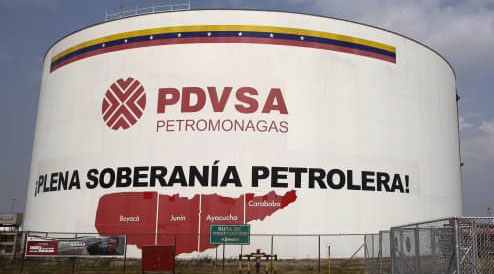HOUSTON, (Reuters) – ConocoPhillips is trying to seize PDVSA’s oil assets at the 335,000-barrel-per-day (bpd) Isla refinery in Curacao, which would expand its control over the Venezuelan state-run company’s barrels for export, according to sources close to the matter.
Under court orders to enforce a $2 billion arbitration award by the International Chamber of Commerce (ICC), the U.S. oil firm last week temporarily seized about 4 million barrels of crude that PDVSA had stored on the Dutch Caribbean island of St. Eustatius and took control of a terminal on Bonaire, prompting PDVSA to move several oil tankers away from the region.
Conoco’s actions could affect PDVSA’s ability to export some 400,000 bpd shipped from the Caribbean, or about a third of its total exports, according to Reuters calculations based on the state firm’s internal reports.
The legal maneuvers further imperil PDVSA’s declining oil revenue and Venezuela’s economy, which is in deep recession with shortages of medicine and food.
OPEC-member Venezuela is almost completely dependent upon crude exports, which slid 29 percent to 1.19 million bpd in the first quarter, according to Thomson Reuters Trade Flows data. Its refineries ran at just 31 percent of capacity from January through March.
Piling pressure on Venezuela, Canadian mining company Rusoro is seeking the attachment of assets belonging to Citgo as part of an arbitration dispute, according to a Monday filing in the Southern District of Texas.
In 2016, Rusoro was awarded more than $1.2 billion in damages awarded by a World Bank tribunal that ruled that Venezuela had unlawfully seized the company’s gold mine, but Venezuela has yet to pay.
Conoco’s writs of attachments, served through at least two court orders on facilities in Aruba, Bonaire, Curacao and St. Eustatius, are seen as a legal maneuver to temporarily retain assets — from stored oil, to cargoes and facilities — and could empower the U.S. company to sell them later.
In Curacao, the court order originally was rejected because of an error in the name of the entities, a PDVSA source and an employee close to the refinery’s operations said.
But Conoco believes it can still take possession of the oil inventories and other assets, according to a person familiar with the matter.
Conoco signaled it would move on PDVSA assets anywhere in the world to collect on the ICC ruling.
“PDVSA is a global company with global assets,” Conoco spokesman Daren Beaudo said in a statement. “We will pursue all available legal avenues.”
PDVSA did not respond to a request for comment.
BONAIRE DEAL
FOR OIL
On Bonaire, a portion of the fuel stored at the terminal plans to be released for local use at a power station under a deal struck late on Sunday between acting Governor Curvin George, PDVSA’s Bonaire Petroleum Co and Conoco, according to Dutch officials.
“Through a joint effort, we could avoid a power-down on the island,” said Karim Mostafi, a spokesman for the Dutch Infrastructure Ministry. The release will provide one to two weeks’ worth of supply for the island’s electric utility.
Talks are also under way for a longer-term solution, he said.
Bonaire held about 800,000 barrels of fuel oil, according to a source close to the operations. In Aruba, most oil inventories belong to PDVSA’s U.S. refining arm Citgo Petroleum.
Conoco was looking for up to $33 billion through two arbitration actions against Venezuela and PDVSA, the largest claims by any company. The ICC awarded it $2.04 billion out of the $22 billion originally sought in that court.
Several previous attempts by bondholders, creditors and foreign firms to receive compensation from Venezuela for pending debts or expropriated assets have failed amid payment delays, prolonged arbitration or ongoing lawsuits.
The threat of seizures prompted quick action by PDVSA. According to one letter seen by Reuters, the company sent urgent notices to its fleet calling the vessels back to Venezuela to avoid possible retention of the tankers or the cargoes.
As of Monday, less than a dozen tankers were near Curacao and only one was close to Bonaire, most of them empty, according to Reuters vessel tracking data. At least nine tankers have been moved since Friday from those Caribbean islands to Venezuela or Cuba, the data showed.
To compensate for the loss of Caribbean operations, PDVSA could widen shipping from its main crude port of Jose and smaller terminals along its western coast. But Jose is facing a growing bottleneck of vessels due to lack of inventories for exports, equipment malfunctions and shortage of staff, shippers said.
Two dozen oil tankers – double the normal amount – were waiting on Monday to load crude at Jose for export, according to the Reuters data.









